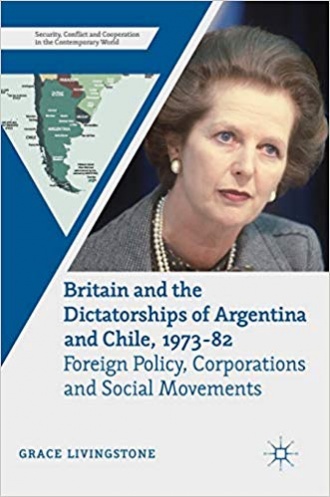This is the last article you can read this month
You can read more article this month
You can read more articles this month
Sorry your limit is up for this month
Reset on:
Please help support the Morning Star by subscribing here
Britain and the Dictatorships of Argentina and Chile, 1973-8:
Foreign Policy, Corporations and Social Movements
by Grace Livingstone
(Palgrave Macmillan, £79.99)
DON’T let the rather cumbersome title of Grace Livingstone’s book put you off, even if the price might, because it's a very readable and pioneering work. Although Livingstone is scrupulously accurate and bases her arguments on extensive research, she makes little secret of where her sympathies lie — and they are not with dictators or arms manufacturers.

By examining released government documents of the period and interviewing not only politicians and civil servants but also those involved in the Latin American solidarity movements, she exposes how successive British governments have been centrally involved in selling arms to dictatorial regimes like Pinochet’s in Chile and the military junta in Argentina and how, in doing so, ministers routinely violated their own guidelines on human rights.
While she shows that there were considerable policy differences between Labour and Conservative governments, this difference was, in part, down to the pressure exerted from outside government by solidarity groups, Labour Party branches and trade unions and it helped tip the balance.
She also examines the different attitudes to the Chilean and Argentinian dictatorships, particularly in the light of the Malvinas/Falklands conflict and makes clear that the determination to keep the islands under British sovereignty had little to do with the inhabitants or the despotic Argentinian generals but very much to do with energy prospects in the South Atlantic and strategic concerns.
She shows, on the basis of Foreign Office documents, how officials actually welcomed the overthrow of Allende’s democratic government in 1973 and how civil servants regularly entertained Argentinian junta officers in pursuit of arms sales.
Livingstone looks closely at the role played by civil servants and diplomats and the often key influence they have over government policy and action. One of her central themes is to examine to what extent elected politicians have the freedom to implement policy and how far they are constrained by external factors.
The work is, I believe, unique in undertaking an in-depth examination of the role of the state during this important period for international relations, because no-one to date has undertaken such a holistic and intelligently perceptive approach to examining government policy, bringing in issues of class, economics, the role played by solidarity pressure groups and trade unions and structural factors.
Interestingly, as an adjunct to the conservative role played by many civil servants, she looks closely at their social class, socio-economic and cultural status, upbringing and education and the social circles in which they move in order to demonstrate the link with their generally conservative, if not reactionary, politics.
There is so much of value in this book. Although it is nominally an academic work, it is written in a clear and accessible style so that everyone can profit by reading it. A vital contribution to our historical understanding of how the state works.









